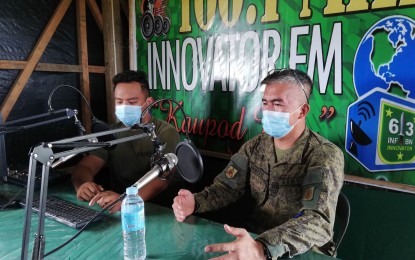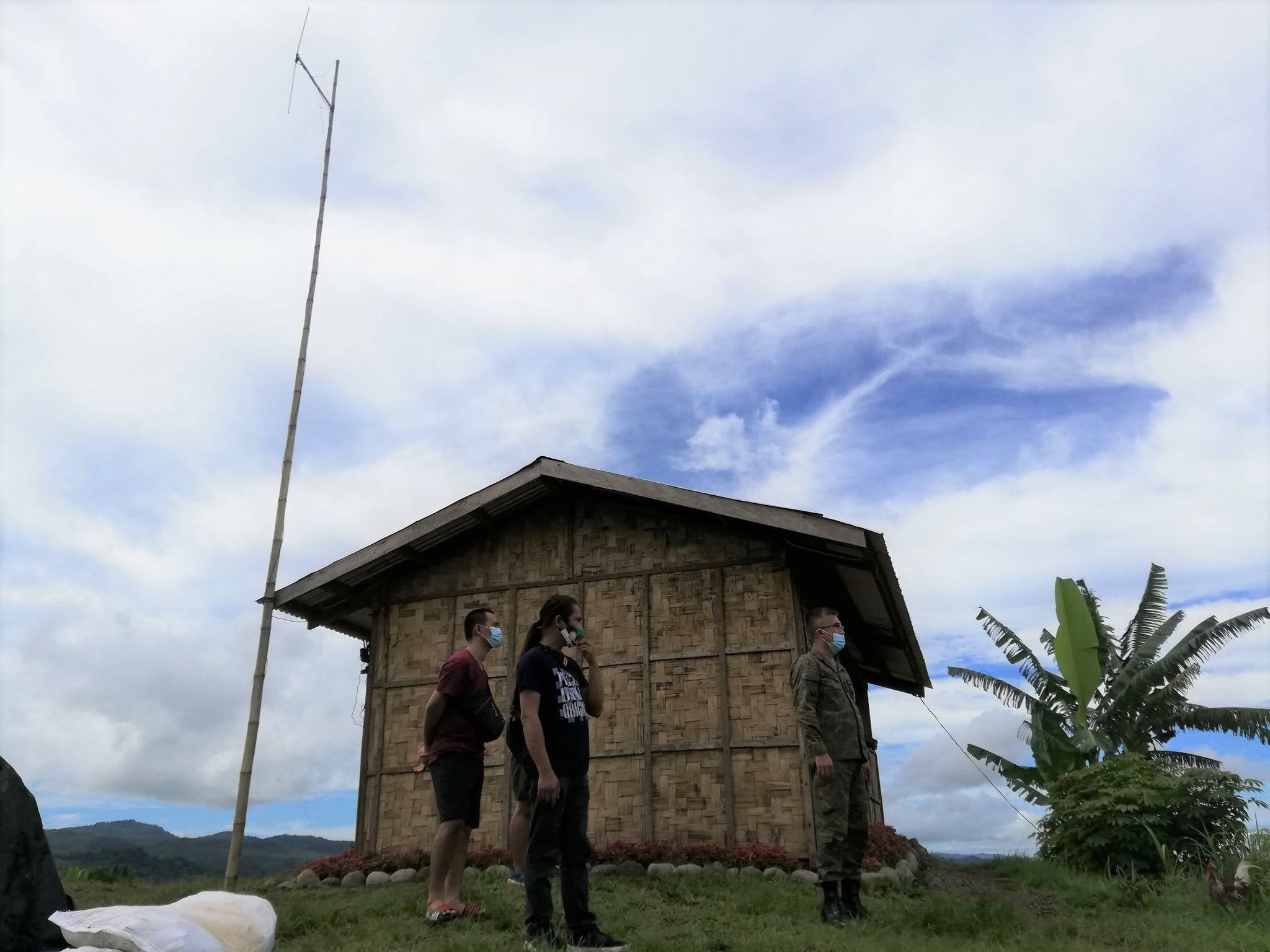
ON AIR. Philippine Army 63rd Infantry Battalion commander Lt. Col. Edgar Allan Orbito (right) during a radio program in this undated photo. The battalion is largely counting on its radio station to sustain peace efforts in far-flung communities of Basey, Samar, formerly influenced by the New People’s Army. (PNA photo by Sarwell Meniano)
BASEY, Samar – The Philippine Army 63rd Infantry Battalion (63rd IB) is largely counting on its radio station to sustain peace efforts in far-flung communities of Basey, Samar, formerly heavily influenced by the New People’s Army (NPA).
The military unit set up a radio booth housed in a makeshift structure built inside the battalion camp in Guirang village, situated 800 meters above sea level.
With a budget of PHP20,000, the battalion has acquired a transmitter, antenna, mixer, cables, and other basic equipment.
“When we entered here, we noticed that many farmers listen to the radio. We want to take advantage of that avenue since we don’t have many soldiers to disseminate information from the government in each community,” said 63rd IB commander Lt. Col. Edgar Allan Orbito in an interview on Thursday.

About 30 out of the 51 villages in Basey town have been reached by the community FM radio station, located about 43 kilometers northeast of Tacloban City, the regional capital.
Most of their listeners are from the villages of Guirang, Mabini, Manlilinab, Cogon, Cancaiyas, and Loog, previously infiltrated by the Communist Party of the Philippines–News People’s Army (CPP-NPA) during the height of the insurgency in these areas from 2014 to 2018.
“Internet connectivity and phone signals are very unstable in these communities. We have to ensure that all locals are aware of the government’s programs and projects. The medium is very effective since a rebel was convinced to surrender after learning over the radio about the assistance for former rebels just a few weeks ago,” Orbito said.
Dominador Cabab, 28, an NPA fighter for six years, said the army’s radio program was a big factor in his decision to surrender on April 4, 2021.
The news about the assistance being given by the national government to the rebels who turned their backs on the atrocities of the terror group, solidified his longing to return to normal life.
“My mother is a regular listener of their radio program. After hearing the package of assistance under the Enhanced Comprehensive Local Integration Program or E-CLIP, she convinced me to show up at the military camp and surrender,” said Cabab, now temporarily employed as an errand person and gardener inside the army headquarters set up in their village.
Launched in July 2020, the radio station goes on air from 5 p.m. to 7 p.m. every Tuesday, Thursday, and Saturday.
The unstable power supply in the area and the high cost of electricity limits the radio programming to only three times weekly, Orbito added.
The military official said radio programs will help ensure that former NPA armed members, militiamen, and community organizers will never again embrace the CPP ideology.
Between 2019 to 2020, at least 228 rebels surrendered to the military after intensified combat operations and the conduct of retooled community support program (RCSP), a major strategy to dismantle the NPA, the CPP’s armed wing.
The RCSP teams have identified issues and concerns in remote communities threatened by the communist terrorist group and these were addressed by national government agencies and the local government.
“There were series of armed encounters in the latter part of 2019 in Basey and nearby towns leading to the discovery of four lairs. While we’re doing community outreach, we also conducted combat operations until the guerrilla front here was dissolved,” Orbito added.
The 228 former rebels, including 45 fighters, have been formed into a group of peacebuilders, prioritized by the government in the provision of livelihood assistance while taking an active role in localized peace negotiations.
The formation of the peacebuilders’ group is a priority project of the regional task force on ending local communist armed conflict (ELCAC) and operationalizes Executive Order No. 70 issued by President Rodrigo Duterte on Dec. 4, 2018.
The directive also institutionalizes a “whole-of-nation approach” in attaining an inclusive and sustainable peace.
The CPP-NPA, which has been waging a five-decade armed struggle against the government is listed as a terrorist organization by the United States, the European Union, the United Kingdom, Australia, Canada, New Zealand, and the Philippines. (PNA)
